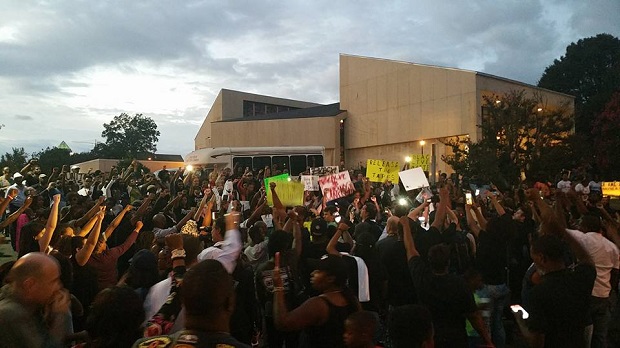
Protesters after the police shooting of Keith Lamont Scott in Charlotte, North Carolina on September 21, 2016. Photo credit: Travis Jones
“I am concerned for my son and grandchildren in the wake of the recent murders of African Americans at the hands of the police and the subsequent retaliatory violence/murder targeting police officers.”
“I felt suffocated at work because there was no space to talk about and process events that’s happened. I try to distract myself by keeping busy, but it wasn’t effective. My productivity was at its all-time low. I was suffering quietly on my own at my cubicle. It’s ridiculous that it’s this way.”
“Realizing how privilege comes with being born white has left me brokenhearted. There are habits, life-choices, and instincts that I will never have to practice because of this.”
“I am also experiencing more health symptoms like tiredness, stomach aches, high blood pressure, and feel distracted for long periods of time during the work day.”
“While the events nationally are troubling, what is most concerning is that my institution has said nothing. It makes me question the values of the institution and whether I belong here.”
“As a white mom of two black sons, I’d add bouts of periodic terror to the list. I’m beyond frustrated that “all lives matter” seems to be the most common response to “black lives matter.” If all lives really DID matter, there would be no need for this conversation. The sad reality is all lives DON’T matter; or at least, they all don’t matter to the same degree.”
These insights were shared in a recent survey administered by The Winters Group that explored the impact that racial injustices have on employees in the workplace. On Tuesday, we continued our Virtual Learning Lab series on “Race and Trauma in the Workplace” and gave participants a medium to practice having difficult dialogue around these tragedies. This learning lab was on the heels of the release of body camera and police helicopter footage that captured the murder of Terence Crutcher by a police officer in Tulsa, Oklahoma. Many participants (some based in OK) shared how they, themselves were mourning, and how their employees were also impacted. The dialogue was so timely.
Later that night, the nation’s eyes were on Charlotte, North Carolina. This time after the murder of Keith Lamont Scott, a black man, killed by a Charlotte police officer. Since then, protests have erupted, and images of the manifestations of the trauma associated with recurring instances of racial injustice have dominated mainstream media and social media outlets.
It is all so overwhelming.
Even as I write this post, my feelings are unresolved. There’s sadness for the family, children, and friends of Keith and Terence. There’s anger and frustration at the fact that this is happening again. There’s fear because when I see the images of those killed, I see myself, my father, brother, granddad, my unborn son.
One of the themes that was constantly underscored by [black] participants during our labs was this longing to be acknowledged by their organizations, particularly during times as these. A longing for their trauma, range of emotions…humanity to be acknowledged, by their employers, leaders, and co-workers. I suspect going to work this week has been a challenge for many, and some may never experience that acknowledgement. So, that’s what this post is. To those who feel unheard, unseen, alone, and perhaps, misunderstood in those spaces they occupy 8 hours a day, 5 days a week: We hear you, we see you, we stand with you, and we understand.


















